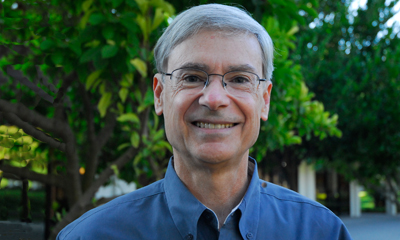Profile of Distinction: Dennis Monticelli

An Interview with Dennis Monticelli
TI Fellow, Texas Instruments
Interviewed for the Fall 2010 ECE Current newsletter
- UCSB Degree: Bachelor of Science, Electrical Engineering, 1974
- Company: Texas Instruments, Silicon Valley Labs
- Principal Responsibilities at NSC: strategic planning of technology, collaborative research, and business development
- Honors at NSC: fellow and a member of the NSC Patent Hall of Fame (20 patents in the area of circuit design)
 Video of Interview with Dennis Monticelli
Video of Interview with Dennis Monticelli
Dennis Monticelli received his BSEE from UCSB in 1974 and joined National Semiconductor Corporation upon graduation. For 16 years he worked on a wide variety of analog and mixed signal development projects, both as a circuit designer and as Design Manager. He was selected to lead the newly formed Power Management business unit in 1991, promoted to Vice President in 1995, and named National Fellow in 2000. From 2000 to 2010, he was CT for the Analog Group and subsequently CTO for National Semiconductor corporate with responsibilities in strategic planning of technology, collaborative research, and business development. Following the acquisition of National Semiconductor by Texas Instruments in 2011, he was named at TI Fellow and joined Silicon Valley Labs in Santa Clara, TI's west coast research group.
Why did you choose UCSB over other colleges?
I think the primary reason was that there was a teacher at my high school that had attended UCSB in the very early years and he spoke very highly of the education I would get there. He knew the educators and knew their dedication to teaching and he said for an undergraduate education, you will get as good or better there and probably more professor attention than some of the other campuses.
What was a pivotal moment or class for you at UCSB?
When I started taking graduate classes in my senior year, it was then that I discovered the world of integrated circuits and what was happening. Really a revolution was in progress and I wanted to be a part of that. It really dictated where I went when I entered the industry.
How has the knowledge you gained in the ECE department helped you at National?
Well certainly the fundamental grounding you get in your undergraduate years is important. I’ve saved a lot of my course notes. And then there is the specialization. I specialized in semiconductor devices and circuits my final year and that became my career. So that was extremely instrumental in terms of making me attractive to companies and hit the ground running when I came here.
Since you’ve been working at National, what has been one of your proudest moments?
I’ve been here a long time, so there is a lot of history here at National. In terms of what I’m the most proud of, on the technical side of my career, which is the longest arm in my career, probably developing the world’s first high performance CMOS Operational Amplifier. That was a turning point, not only for the company but also for the industry. That was a big deal. That was back in 83. Then on the business side of my career, it’s founding and growing the power management business unit. It grew into the biggest business unit in the company and today represents over half our revenue.
Do you still work with the College of Engineering?
More recently there has been a fair amount of discussion going on about collaborations in the areas of 3-5 materials, especially gallium nitride transistors for applications in power, which is a new application for GaN as opposed to the traditional high frequency application: power amplifiers for communication. We are talking power conversion, energy efficiency.
How would you say we as a department could better serve our students?
Internship opportunities are something I’m very positive on. I help drive that here at National Semiconductor. The more any department can do to encourage these internships the better. And they seem to be most valuable at the graduate level, both masters and PhD.
What advice would you give to students in the College of Engineering?
Make sure that engineering is something you enter in for all the right motivations. It really should be something that you derive energy from, you’re passionate about, and something that you would be willing to really stick to. It has to have some intrinsic connection with you. And as for courses, when you’re an undergrad, be broad, even if you have a pretty good idea of what you want to specialize in. This is your opportunity to sample a lot of things. Find your passion, stay uncommitted for a while, and then go for it. Really go for it.